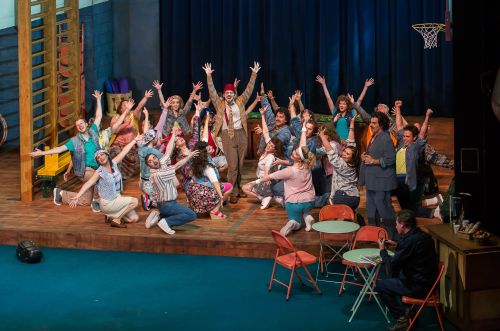Antonio Cagnoni: Don Bucefalo, Orchestra and Chorus Wexford Opera Festival, Sergio Alapont (conductor), Wexford Opera House, 26.10.2014 (JMI)

Cast:
Don Bucefalo: Filippo Fontana
Rosa: Marie-Eve Munger
Count Belprato: Matthew Newlin
Agata: Jennifer Davis
Carlino: Peter Davoren
Don Marco: Davide Bartolucci
Giannetta: Kezia Bienek
Production: Wexford Festival
Direction: Kevin Newbury
Sets: Vita Tzykun
Costumes: Jessica Jahn
Lighting: DM Wood
As in the past, the Wexford festival offered three rare operas in 2014: one comic opera, one showcasing the singers and, finally, one to make people think. This concept matched well with the three titles chosen this year: Don Bucefalo by Antonio Cagnoni, Salome by Antoine Mariotte (not Richard Strauss) and Silent Night by Kevin Puts.
I think if two parallel festivals exist they are Wexford and Martina Franca: both offer forgotten operas with young casts. The main difference is that the Italian event takes place in the summer, while in Ireland it’s now autumn, a rather unusual time for an opera festival. The Westford festival enjoys very good health with opera lovers present from around the world, and the patrons are no less elegant than in Salzburg or Bayreuth.
Don Bucefalo is an opera buffa by Antonio Cagnoni, a contemporary of Verdi. It was his first important opera and had a great success at its premiere at the Milan Conservatory in 1847. He was just 19, but despite his youth this was his third opera, and it soon became known in the main Italian and European theaters. It later fell into oblivion and was not revived until 2008 at the Martina Franca festival. His last opera, Re Lear, was never performed during his life and had its premiere at Martina Franca four years ago.
Don Bucefalo does not deserve to have been forgotten. No wonder that its premiere was a success: it is a very enjoyable work. It’s true that in the second half of the 19th century, the public lost interest in comic operas, and this may explain its disappearance from theaters. In Martina Franca it was well received, as it was in Wexford.
The plot offers two actions in parallel. In one we meet Don Bucefalo, a kind of Dulcamara. He arrives in a village and convinces the inhabitants that he is a singing maestro who can make great opera singers with their excellent voices, and he organizes a performance. Then there is the love story of Rosa, a supposed young widow, desired by Count di Belprato and Don Marco. Carlino, Rosa’s husband, who did not really die in the war, appears at one point in disguise. In the last act, during the rehearsal of the opera, everything becomes clear and there’s a happy ending.
The staging is by director Kevin Newbury, who has created a fun and colorful work. He brings the action to the ’80s and sets it in a sort of gym that the young locals attend. Don Bucefalo arrives in town chased by the police, and he goes into the gym where he starts to sell his services. The sets are simple and well-suited, and the costumes appropriate. The stage direction is excellent with many amusing details, particularly the scene of the orchestra rehearsing under Don Bucefalo. Kevin Newbury believes in this opera, and he does a terrific job with it.
The musical direction was in the hands of Sergio Alapont, whose conducting was lively. He seemed to enjoy Cagnoni’s music, and under his baton the Wexford festival’s orchestra did well. The chorus is made up of young people, and they gave a remarkable performance, particularly on stage.
Don Bucefalo was played by Filippo Fontana in a superb performance. He is a real basso buffo in the best Italian tradition, and his voice and work on stage were impressive. Both in his cavatina and in the hilarious scene of the orchestra rehearsal, he showed that in this genre he can have a bright future.
Soprano Marie-Eve Munger was good as Rosa. She is a light soprano, easy on stage and also in coloratura. Top notes are not a problem for her although they are too metallic.
Tenor Matthew Newlin was a good interpreter of Count di Belprato. His voice is attractive and easy at the top. Next month he’ll sing Tamino at Berlin’s Deutscheoper.
The other characters are less important, but soprano Jennifer Davis was quite good in the part of Agata, the friend and singing rival of Rosa. Peter Davoren was a rather modest Carlino, while Davide Bartolucci was a serviceable Don Marcowith an unattractive voice.
TheOperaHouse was almost sold out. The audience had a great time during the show, judging by the laughter that could be heard.
José Mª Irurzun